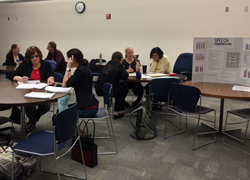Current Projects and Events
Here's a link to our 2013-2016 Workplan, part of a larger plan developed at the AAC&U General Education Workshop in Vermont, June, 2013.

Requests for Assessment Projects
2016-2017
Context and Instructions
This year the Assessment Team is calling for assessment projects from division, program, discipline, or department teams. We have revised the scope of projects to focus on Core Learning Outcomes (CLOs) and to develop more intentional, systematic, and institutional approaches to assessment.
We invite you to consider applying for funding that best matches your division, program, department, or discipline’s interests and level of preparation for assessment work. We realize that proposals may span several of the options listed below; consequently, funding this year is variable and dependent on the number of faculty involved and the complexity of proposed projects.
If faculty have a project in mind that does not exactly fit into the parameters below, we urge you to contact Sarah Lushia, Lane’s CLO Coordinator (ext. 5482), or Kate Sullivan, Chair of the Assessment Team (ext. 3256), to discuss your ideas. Please, also, consult the assessment page, which houses a number of previous and varied projects.
Types of projects funded should involve 3 or more faculty representing a division, program, discipline, or department. Solo endeavors will not be funded. Funding will be distributed after the project is completed, and the report submitted and shared with the division, program, discipline, or department.
- Development of Supplemental Materials (20-30 hours): for the integration and increased visibility of course outcomes (e.g., shared syllabi, signature[1] projects, other supplemental documents);
- Mapping of course-level outcomes and materials to CLOs (20-35 hours);
- Rubric and Grading Criteria Development (or Refinement) (includes mapping to CLOs, or making them visible/clear) (20-35 hours): for a signature1 project or varied assignments within courses or sequences;
- Artifact Collection (Student Work) and Assessment (50-80 hours): This process should include consultation with Molloy Wilson, Institutional Researcher, about methodology. These projects are for faculty teams that have already developed a specific rubric and started mapping outcomes to CLOs.
Projects may focus on:
-
- Assessing one or more CLO(s) using a rubric and scoring artifacts across a series of similar courses in the department, program, or discipline;
- Assessing one or more CLO(s) using a rubric and scoring artifacts collected from multiple sections of the same course;
- Assessing one or more CLO(s) using a rubric and scoring artifacts collected from a course sequence.
E. Revision of earlier CLO project (e.g., revision/refinement of a rubric developed for an earlier project) (5-10 hours).
In addition to project funding, the college is supporting an assessment fellows program. Faculty may apply to be an assessment fellow, a position that requires the individual coordinate assessment efforts within his/her division, program, discipline, or department. Assessment fellows receive one 3-4-credit course reassignment for their work. Information on the application process to become a fellow.
Project Process
Lane’s assessment activities are moving in the direction of more systematic and recursive assessment projects that are integrated into our ongoing work of teaching and learning. As you plan and implement an assessment project, we ask that you do the following:
Before you apply:
- Plan your project after reading through this entire document and speaking to your peers;
- Assemble your team, which ideally will include both PT and FT representation (the size of teams will be dependent on the number of faculty within a given division, discipline, program, or department). Solo endeavors are not eligible for funding;
- Secure involvement and support from the division dean and program coordinator or faculty lead (please see sign-off portion of the application form).
After funding has been offered:
- Schedule an initial 1-2 hour planning meeting with an Assessment Team representative to discuss the scope of the proposal, agree upon project goals and outcomes, establish an initial timeline for completion, and identify needed support and resources (e.g., does the team want a note taker, a meeting facilitator, etc.). The amount and frequency of contact with Assessment Team members will depend on a team’s needs. The initial meeting is required, and we encourage regular, subsequent contact and collaboration;
- Plan to share a summary of your project with the Assessment Team at spring in-service in 2017, when we will be holding an Assessment Team Open House and Recognition Gala (invite your colleagues and dean!);
- Submit the team’s project report, including assessment data if generated, and close the loop; this report will include details of how your findings with members of your division, discipline, department, or program;
- Submit each team members hours to the CLO coordinator, Sarah Lushia, who will coordinate disbursement of payment.
[1] Signature projects are activities/projects and/or assignments shared across sections of a particular course that have the same directions/parameters. Faculty might decide that all sections of a given course should use a shared exam question or assign the same paper option, for instance.
- Use this link for an online version of the RFP form.
- Use this link if you'd like a .doc of the RFP form.
When you have finished your project, lead faculty for the project will need to collaborate with their project team to complete and submit the online Project Report Form.
Examples of strong project reports: strong project report example #1 and strong project report example #2.
Powerpoint from Spring Conference 2015
Kate Sullivan's Powerpoint, "What Are Lane's Core Learning Outcomes, and Why Do They Matter to Me?"
